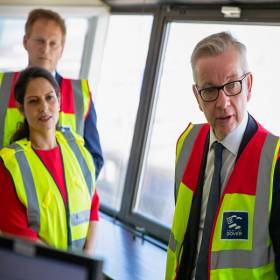Displaying items by tag: UK ministers visit
UK Minister Of State Visits Harland & Wolff Group's Belfast Shipyard
The UK's Minister of State at the Department for Business, Energy and Industrial Strategy, Nusrat Ghani MP was welcomed to Harland & Wolff Group's iconic Belfast shipyard site.
The multisite fabrication company of Harland & Wolff with over 160 years of maritime and offshore engineering pedigree, formed as part of the visit by Ms Ghani who toured the yard.
Ms. Nursat met the Harland & Wolff Group CEO, John Wood and observed the ongoing work as part of the two contracts awarded by Cory for the fabrication of 23 barges which, combined, are worth over £18 million.
This is the first ship build contract win for Harland & Wolff since its Belfast yard was acquired in 2019, now, the company anticipate further such contract wins as it actively targets major fabrication programmes such as Fleet Solid Support warships.
The visit showcased the recent investment and improvements that Harland & Wolff has made to both the site and its workforce, this has included the installation of a state-of-the-art welding robot which cuts manual welding times by 60%, as well as a site-wide workforce ramp up which has brought long-term employment to Belfast and beyond resulting in over 200 employees by the end of 2022.
The company has also recently partnered with Power NI to see the site supplied by local, renewable energy sources, saving over 826 tonnes of CO2 per year.
During the visit she commented: “Shipbuilding is a core part of our industrial heritage, and the cutting-edge high-tech work underway at Harland & Wolff is proof it is key to our future too. Our world-leading shipwrights create high-skill jobs and boost the economy right across the UK, and we’re determined to support them through our refreshed National Shipbuilding Strategy.”
John Wood, Group CEO of Harland & Wolff commented: “It has been a great pleasure to welcome Minister Ghani to site today and to share with her the Harland & Wolff story and future Group-wide growth opportunities. Under the iconic backdrop of our two gantry cranes, Samson and Goliath, we hope this visit has brought the Harland & Wolff vision to life.”
Nusrat Ghani was appointed Minster of State at the Department for Business, Energy and Industrial Strategy in September 2022.
She was previously Parliamentary Under Secretary of State at the Department for Transport from January 2018 to February 2020 and was a Government Whip between July 2019 and December 2019, and an Assistant Government Whip from January 2018 to July 2019.
Harland & Wolff is a multisite fabrication company, operating in the maritime and offshore industry through five markets: commercial, cruise and ferry, defence, energy and renewables.
Its Belfast yard is one of Europe’s largest heavy engineering facilities, with deep water access, two of Europe’s largest drydocks, ample quayside and vast fabrication halls. As a result of the acquisition of Harland & Wolff (Appledore) in August 2020, the company has been able to capitalise on opportunities at both ends of the ship-repair and shipbuilding markets where there will be significant demand.
In February 2021, the company acquired the assets of two Scottish-based yards along the east and west coasts. Now known as Harland & Wolff (Methil) and Harland & Wolff (Arnish).
Harland & Wolff is a wholly owned subsidiary of Harland & Wolff Group Holdings plc (previously known as InfraStrata plc), a London Stock Exchange-listed firm. In addition, it also owns the Islandmagee gas storage project, which is expected to provide 25% of the UK’s natural gas storage capacity and to benefit the Northern Irish economy as a whole when completed.
The UK and Europe's busiest ferryport the Port of Dover has recently appointed a chief operations officer.
On an annual basis the English Channel port according to the Port of Dover handles 18,000 vessels in a 24/7 operation enabling to provide a critical link in Britain’s economy. The port in Kent offers essential gateway services for 2.5 million HGVs and around 12 million passengers with up to 120 ferry arrivals and departures each day.
In addition the Port also has a thriving cruise business (see Afloat story) and expanding cargo business, which highlights its diverse range of activity.
The first stage of the £250 million Dover Western Docks Revival (DWDR) project is nearing completion – a project which will deliver an additional 20% of operational capacity and platform for growth and regeneration. This, combined with the challenges of the UK's departure from the European Union, make it an interesting and vital time to take on the role of COO at the Port of Dover.
The incoming COO, Sarah West stated: “I am delighted to be joining the team at the Port of Dover at such an exciting time, when the Port has great opportunities for growth and further successes. I look forward to working with my new colleagues to build long term, sustainable relationships with our customers based on operational excellence.”
Commenting on the port's appointment, Doug Bannister, CEO said: “Operating Europe’s busiest port, and continuing to deliver our services to a high standard whilst going through a period of uncertainty requires a high calibre Chief Operations Officer. Equally, looking towards the future and setting the strategy for operational improvements given advancing technology and sustainability, presents a compelling proposition for the right candidate. I am delighted that we have secured Sarah into this important role for the Port."
Sarah is expected take up the appointment in the Autumn.





























































